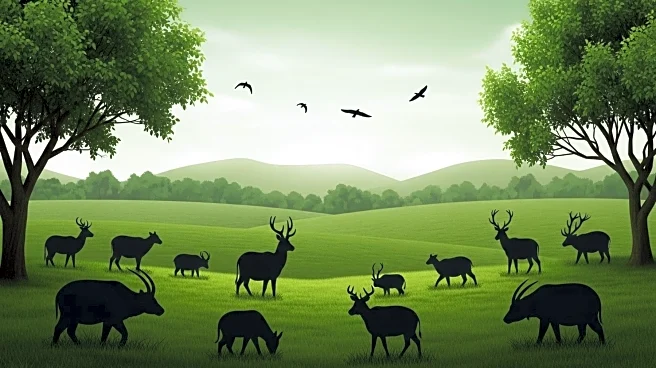What's Happening?
A recent study has revealed how agriculture and livestock farming have reshaped mammal communities over the past 10,000 years, following the last Ice Age. The research, led by Barry Brook at the University of Tasmania, traces 50,000 years of animal history, highlighting a significant shift in mammal community composition. During the Late Pleistocene, mammal communities were shaped by climate zones and geographic barriers. However, the advent of farming led to the spread of domesticated species, collapsing these natural boundaries and making distant regions appear similar. The study emphasizes the role of agriculture and hunting as global forces that have reorganized ecosystems, complicating conservation efforts today.
Why It's Important?
The findings underscore the profound impact of human activities on natural ecosystems, highlighting the challenges faced by conservationists in preserving biodiversity. The replacement of native mammal communities with domesticated species has altered ecological dynamics, affecting the balance of ecosystems. Understanding these historical changes is crucial for developing effective conservation strategies and managing protected areas. The study provides insights into the long-term consequences of human intervention, emphasizing the need for sustainable practices to mitigate further ecological disruption.
What's Next?
The study's insights could inform future conservation efforts, guiding strategies for rewilding and the restoration of native species. Researchers may continue to explore the effects of human activities on ecosystems, using advanced methods like 'chase clustering' to analyze fossil datasets. These efforts could help disentangle the impacts of hunting, climate change, and domestication, providing a clearer understanding of human influence on biodiversity.
Beyond the Headlines
The research highlights the ethical considerations of human intervention in natural ecosystems, raising questions about the responsibility to restore and protect biodiversity. The historical reshaping of mammal communities serves as a reminder of the long-term consequences of human actions, prompting discussions on sustainable development and conservation priorities. The study also offers a new perspective on the concept of 'naturalness,' challenging traditional views and encouraging a reevaluation of conservation goals.











